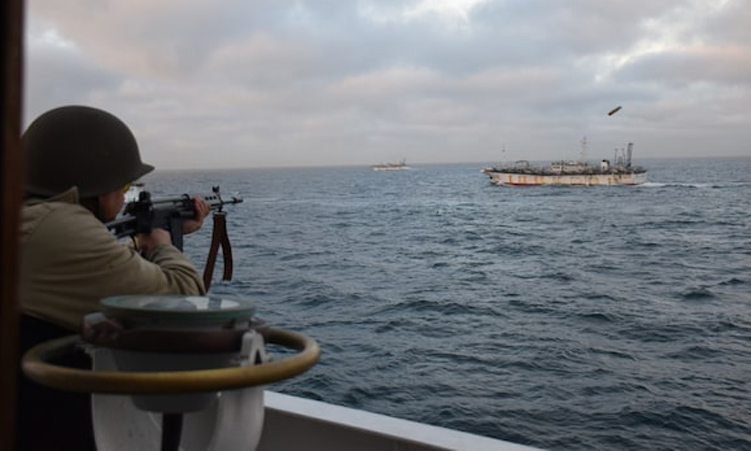In the squid grounds off the coast of Patagonia, a rusty Chinese squid jigger, called the Lu Yan Yuan Yu 10, was fishing illegally in Argentina’s national waters on 14 March 2016.
Spotted by an Argentine coast-guard patrol and ordered over the radio to halt, the specially designed squid-fishing ship fled the scene.
The Argentinians gave chase and fired warning shots.
The vessel then tried to ram the coast-guard cutter, prompting it to open fire directly on the jigger which soon sank.
Although the violent encounter at sea that day was unusual, the incursion into Argentine waters by a Chinese squid jigger was not.
Owned by a state-run behemoth called the China National Fisheries Corporation (CNFC), the Lu Yan Yuan Yu 10 was part of a fleet of several hundred Chinese jiggers that makes annual visits to the high-seas portion of the fishing grounds that lie beyond Argentina’s territorial waters.
During their visits, many of these jiggers turn off their locational transponders and cross secretly into Argentine waters, where they are not permitted. Since 2010, the Argentine navy has chased at least 11 Chinese squid vessels out of Argentine waters for suspected illegal fishing, according to the government.
A year after the illegal incursion and sinking of the Lu Yan Yuan Yu 10, Argentina’s Federal Fishing Council issued a little-noticed announcement: it was granting fishing licences to two foreign vessels that would allow them to operate within Argentine waters.
Both would sail under the Argentine flag through a local front company, but their true “beneficial” owner was CNFC.
This decision was noteworthy because it seemed to violate Argentine regulations that not only forbid foreign-owned ships from flying Argentina’s flag or fishing in its waters, but also prohibit the granting of fishing licences to ship operators with records of illegal fishing in Argentine waters.
“The decision was a total contradiction,” says Eduardo Pucci, a former Argentine fisheries minister who now works as a fishing consultant.
The move by local authorities may have been a contradiction, but it is an increasingly common one in Argentina and elsewhere around the world.
In recent years, from South America to Africa to the far Pacific, China has been buying its way into restricted national fishing grounds, primarily using a process known as “flagging in.”
This method typically involves the use of business partnerships to register foreign ships under the flag of another country, thereby allowing those vessels to fish in that country’s territorial waters.
Chinese companies now control at least 62 industrial fishing vessels that fly the Argentine flag, including the majority of Argentina’s squid fleet.
Many of these companies have been tied to a variety of crimes, including dumping fish at sea, turning off their transponders and engaging in tax evasion and fraud.
Trade records show that much of what is caught by these vessels is sent back to China, but some of the seafood is also exported to countries including the United States, Canada, Italy and Spain.
China now operates almost 250 of these flagged-in vessels in the waters of countries including Micronesia, Kenya, Ghana, Senegal, Morocco and Iran.
– theoutlawocean.com
Stay informed with The Namibian – your source for credible journalism. Get in-depth reporting and opinions for
only N$85 a month. Invest in journalism, invest in democracy –
Subscribe Now!







